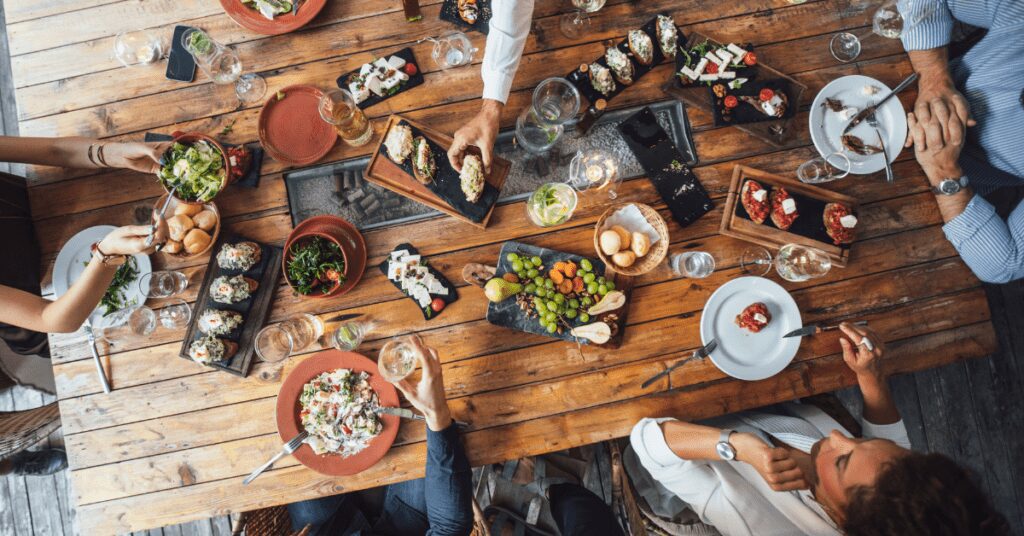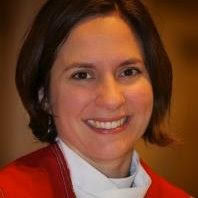Antiracism means going beyond appreciating each other’s ethnic foods. Our congregation is practicing turning meal and story sharing into an act of resistance against white supremacy.
At the first of these meals, we heard the story of a young Ethiopian woman’s journey as a pregnant teenage refugee, walking across Uganda to her freedom. In three years, we’ve heard from Black Baptists from the south and eaten soul food. We’ve eaten French crepes, both savory and sweet, and heard about Sophie’s faith as a scientist. We’ve eaten open-faced sandwiches and heard how a Norwegian farmer never accepted his son’s calling to ministry. These were all stories from our within our congregation—a congregation that in order to resist racism and white domination of our space is trying to acknowledge the diversity of stories that make us who we are.
Are you thinking right now…but at our congregation, we’re all white? You might be surprised. One of the important ways a dominant culture that claims to be a “melting pot” comes to be a dominant culture is by working to erase our differences. In our gatherings, we are trying to learn and recognize our distinctive stories. It’s a practice to appreciate our unique stories and get in touch with how our different stories bring such richness to our faith communities. So, we don’t tell a story that all Cambodians are the same either. We ask one Cambodian to tell her story, and then her sisters and brothers share how their own stories compared and contrasted.
In another era of church and culture, we were forced to give up our original languages and foods in the name of unity. That led to huge resentment when other groups did not want to give these things up. In this storytelling work together, we find, explore and dive into those foods, practices and memories that too often remain hidden. We remember them. We learn from another’s sharing. We learn what has shaped our siblings in Christ and by that activity, we grow deeper in love and solidarity.
When I first arrived at this congregation, I was told “we don’t have racism here; we are family.” But I also learned that people from one group didn’t always know the names of those in another group, and some of our differences were glossed over or erased. For example, our one Dutch member proudly shared that he was probably the only Dutch person in our midst. Another wrote about feeling sort of alone as a person of German Lutheran heritage in this building where there is Norwegian text in the stained glass windows. So along the way, we have invited story after story of one culture and then the next. We still haven’t run out of distinctive stories, and we’ve gotten more and more creative. One evening, we listened to four high schoolers describe the latest lingo for high schoolers, breaking down words that people of other generations had no idea existed.
We used to meet at round tables in our Gathering Space on the Second Saturday of each month. Now, in Covid time, we’ve had to adapt this practice. Most recently, we made or bought borscht and pierogis to eat in our homes (cooking videos and restaurant ideas were shared in advance) and then gathered by Zoom to listen to stories of being born in Poland and being raised by Ukrainian immigrants who survived a totalitarian government.
When we think of racism and white supremacy, as part of a white dominant culture, we think first of those people and groups actively spreading fear and violence. A more subtle and far more widespread tendency, though, is one that Ibram X. Kendi describes in his book How to Be An Antiracist. Kendi writes that when we require people to assimilate or segregate, we are “expressing the racist idea that a racial group is culturally or behaviorally inferior” and so we either “support cultural or behavior enrichment programs to develop that racial group” or assume they “can never be developed and support policy that segregates away that racial group.” Instead, Kendi invites us to the antiracist view that “groups are equals and none needs developing” so that we might support practices and policies that reduce racial inequity.
In Lutheran congregations, we have said that we welcome all and sometimes, that has been true. But even then, we have maybe let 40 years go by without really learning another’s name, story, adapting a passive “live and let live” attitude that does not bring us deeper into the beloved, practicing, antiracist communities that we really need right now.
So I said at this most recent Zoom-edition of Second Saturday, “We share our personal racial/ethnic stories and traditions in community as an act of resistance to white supremacy.” It’s not quite the same as a congregation who shares their annual lutefisk supper, which assumes we are all Norwegian (and the best). It is honoring the story I come from, with its joys and struggles. It is honoring the story you and your ancestors have traveled. When we tell them, when we listen, we find both connections and places of deep difference. We learn what we still need to learn. We are not the same and we need each other in our infinite variety.
Did you know that the dessert I grew up calling “rosettes” (Scandinavian) are also found in Mexico with another name—Bunelos de Viento? It is fun to make these discoveries but also it is a practice with great importance as we listen to God’s call to dismantle domination systems within our congregations, wider church body and culture.
Yes, that is the call of this time—to change a domination culture.
That may be a frightening thought for those who have been taught (by a domination culture) that they must not disagree or even speak about faith, politics, culture (oh my!) and that their faith must be private, not to be seen interfering in other arenas. Increasingly now, it becomes clear that those kinds of views and practices disempower people completely and that is not God’s vision for us. Instead, God brings together people of various gifts to do the work of ministry. In this time and place, a joyful and challenging part of that work is developing hearts and minds freed from sin, fear and domination for love of neighbor.
We do not feel powerful to change the whole system, but this gathering once a month to hear one person’s story and eat the foods that they choose together with them is a concrete act of moving from assimilation and segregation to antiracism. It’s one way we faithfully show up for one another, even during Covid. Jesus meets us around these tables. Try this practice! It’s delicious.

